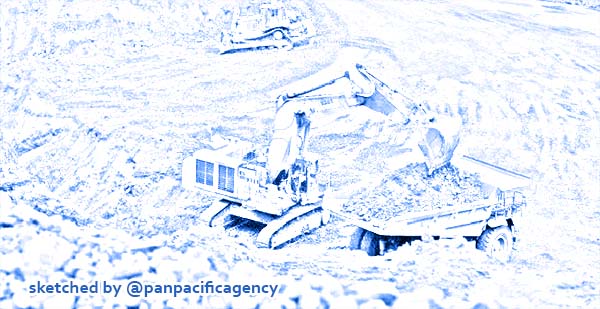China changes iron ore import rules in escalation of trade war over Covid-19 inquiry call

Activities at a nickel mining site. (Kontan/Cheppy A. Muchlis). Sketched by the Pan Pacific Agency.
CANBERRA, May 21, 2020, News.com.au. Trade tensions between Australia and China have escalated again after Beijing imposed new customs inspection procedures on iron ore imports, News.com.au reported.
The move comes on the back of China imposing an 80 per cent tariff on barley and suspending some beef shipments from abattoirs, seen as retaliation for Canberra’s call for an inquiry into the coronavirus pandemic.
The Communist Party-controlled newspaper Global Times has described the latest import change as “another implicit warning to Australia”.
The paper, considered a mouthpiece for Beijing, quoted academic Yu Lei, a chief research fellow at the Research Centre for Pacific Island Countries from Liaocheng University, as saying: “It is associated with how Australia has acted and a general decline in demand for steel on the global level.”
The newspaper’s report on the change went on to say that “Australia’s iron ore export to China could fall victim to the rising bilateral tensions”.
“The announcement comes at a delicate time when the China-Australia relations have ebbed because of Canberra’s incessant efforts to spearhead an independent probe of the COVID-19 outbreak in China in order to stigmatize (sic) the country,” it said.
“China said that the virus, like MERS and SARS, was jumped to humans from a host animal, and was not made in a lab.”
In another editorial, the Global Times declared: “China has the power to hurt the Aussie economy.”
Customs authorities in China today issued a directive about new inspection rules on iron ore, essentially meaning that officials can demand extra checks on imports while waving through others.
The General Administration of Customs said the new procedures would “streamline” imports and “build a better business environment”.
But some analysts in China believe it could see Australian batches of iron ore delayed for inspection while other imports from competing nations “sail through”, The Australian Financial Review reports.
One such analyst, Du Hongfeng, told the newspaper the changes could be manipulated to punish Australian importers.
“Australia asked for a groundless investigation by following a certain country, therefore the market will link this to other things,” Mr Hongfeng said.
Prime Minister Scott Morrison has led the charge on convening an independent global inquiry into the origins of the coronavirus. That move has been supported by the United States, where President Donald Trump has been increasingly critical of China.
Iron ore exports to China brought in $63 billion last year. The majority of China’s iron ore imports come from Australia.
Last month, China’s ambassador to Australia, Jingye Cheng, warned that the country could stop buying Australian-made products.
The Global Times has also repeatedly attacked Australia and the government for its calls for an inquiry.
The Australian Government has attempted to water down talks of a trade war, describing the barley tariff issue as something that’s been brewing for 18 months, and the mean import ban as an “administrative issue”.
Trade Minister Simon Birmingham signalled that Australia could appeal the measures at the World Trade Organisation.
He has also revealed that attempts to speak with his Chinese counterpart have been unsuccessful, with Beijing ignore requests for a meeting to discuss trade.
On Wednesday, the news agency Bloomberg reported that China had prepared a ‘hit list’ of Australian products.
It said that wine, seafood, oats, fruit and dairy exports could face stricter quality checks, delayed customs clearances, anti-dumping probes or consumer boycotts.